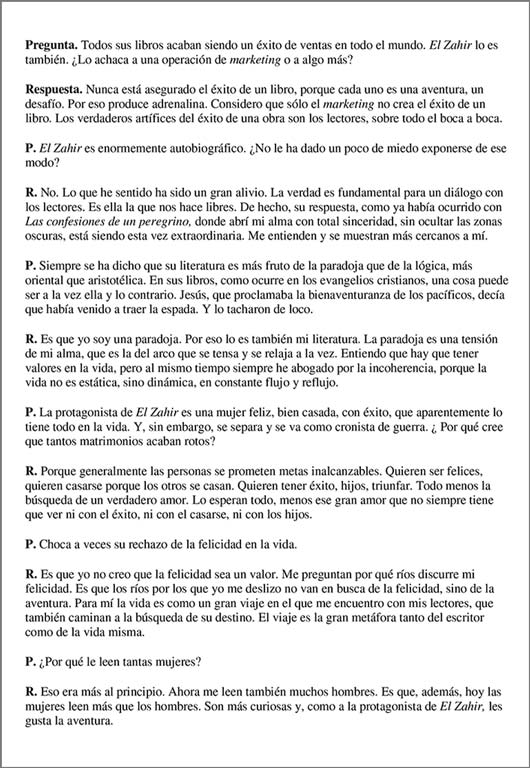

Uncredited interview about The Zahir, in Spanish.
-All your books end up being a bestseller around the world. The Zahir is too. Are you blaming it on a marketing operation or something else?
The success of a book is never guaranteed, because each one is an adventure, a challenge. That is why it produces adrenaline. I believe that only marketing does not create the success of a book. The true architects of the success of a work are the readers, especially word of mouth.
-The Zahir is enormously autobiographical. Didn’t you get a little scared of exposing yourself like that?
No. What I have felt has been a great relief. The truth is essential for a dialogue with readers. It sets us free. In fact, your response, as had already happened with The Confessions of a Pilgrim, where I opened my soul with total sincerity, without hiding the dark areas, is this time extraordinary. They understand me and are closer to me.
-It has always been said that your literature is more the result of paradox than of logic, more oriental than Aristotelian. In your books, as in the Christian Gospels, one thing can be both and the opposite. Jesus, who proclaimed the blessedness of the peaceable, said that he had come to bring the sword. And they called him crazy.
I am a paradox. That is why my literature is also one. The paradox is a tension in my soul, the bow that tightens and relaxes at the same time. I understand that you have to have values in life, but at the same time I have always advocated incoherence, because life is not static, but dynamic, in constant ebb and flow.
-The protagonist of El Zahir is a happy, well-married, successful woman who apparently has everything in life. And yet she separates and leaves as a war chronicler. Why do you think so many marriages end up broken?
Because generally people promise themselves unattainable goals. They want to be happy, they want to get married because others are getting married. They want to be successful, children, to succeed. Everything except the search for true love. They expect everything, except that great love that does not always have to do with success, marriage, or children.
-Sometimes your rejection of happiness in life shocks.
It is because I do not believe that happiness is a value. They ask me through which rivers my happiness flows. The rivers through which I slide do not go in search of happiness, but of adventure. For me life is like a great journey in which I meet my readers, who also walk in search of their destiny. The journey is the great metaphor for both the writer and life itself.
-Why do so many women read to you?
That was more at the beginning. Now many men read me too. Moreover, today women read more than men. They are more curious and, like the protagonist of El Zahir, they like adventure.
-You are a fighter, a man of the sword, but also a man who does not renounce a certain spirituality in his life. How do you pray?
I pray with the image of the bow and arrow. I am not a contemplative. I am a man of action. I need to do. I usually practice the oriental Kyundo method. I pray walking, I pray while I work, at any hour.
-Does your god have a name?
My god is the Verb, the Word. The one who revealed himself to Moses: “I am who I am.”
-How do you explain that, contrary to the past, today’s greatest writers call themselves agnostics or atheists?
Because they are afraid of accepting the border of mystery that exists, and whether we like it or not, will make them inferior. I am not afraid to accept that there is something that we still cannot explain. And that doesn’t humiliate me. On the contrary, it makes me more curious.
-Your novel has an Arabic name and comes out at a time when the Islamic world, albeit unfairly, is in question because of global terrorism. Was it a coincidence or a purpose?It was a coincidence, but it is true that I have always been in love with Islamic culture, whose literature has inspired my literature so much. It is a culture that has always built bridges to hope.
-You have always had, in your works, a kind of obsession with clarity and simplicity. Are you afraid of complexity?
It’s funny, because writing a complicated and dark work would take me only a few weeks. It is much easier than writing clearly. What happens is that darkness and complexity have been confused with a certain intellectuality. There is an intellectual elite that likes to keep culture away from the people. Sometimes I want to make a joke, write a very convoluted and complex work and publish it under a pseudonym. That is very easy.
-With what kind of talisman do you defend yourself against those who envy your literary success?
With none. Simply by denying them a power they believe they have and do not have.
-You have been defined by others in many ways: magician, writer, prophet, mystic, communicator. How do you define yourself?
I am a pilgrim writer who travels the world in search of the many adventures that are still hidden from us.

 Back To Top
Back To Top